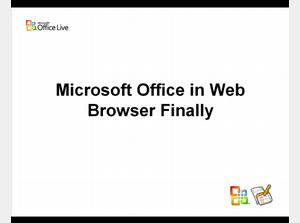Microsoft Office in Web Browser

Microsoft
announced this morning at its PDC conference that the next release of
Microsoft Office will include browser-based versions of some of its
main office software products - Word, Excel, PowerPoint and OneNote.
These will be "lightweight versions", but Microsoft told us yesterday
that they'll still have rich functionality and will be comparable to
Google's suite of online office applications. The apps will enable
users to create, edit and collaborate on Microsoft Office documents
through the browser. The apps will work in IE, Firefox and Safari
browsers (no word on whether Google Chrome will be supported). Update:
Commenter Sean, who says he works on the project, said that this will
be 100% HTML + AJAX - rather than Silverlight or a proprietary MS
plug-in.
The online versions will share the same names as their desktop
counterparts (Word, Excel, etc), although unfortunately they don't
fully escape the awkward and confusing branding that Microsoft gives to
most of its Internet apps. The collective name for these apps is
"Office Web Applications". To remind you, there is also an Office
Online (a separate Microsoft site where users can download templates)
and an Office Live Workspace (for sharing office files between desktop
and Web - our coverage).
The "Office Web applications" will be available to consumers through
Office Live, a service which has both ad-funded and subscription
options. Business users will be offered Office Web applications as a
hosted subscription service and through existing "volume licensing
agreements". There will be a private technology preview of the Office
Web applications later this year.
Last month we ran a poll asking which word processing tool you
primarily use. We got over 2,600 separate votes and a resounding 49% of
people still use Microsoft Word as their main word processing tool. Its
open source desktop equivalent OpenOffice got 16%. Google Docs was the
best placed Web Office app, with 15%.
The results showed that there is still a big place for desktop Office
apps. Nevertheless, with the announcement yesterday of Microsoft Azure
- a so-called cloud computing OS - Microsoft is clearly serving a
growing demand for browser-based office software. We expect these apps
to become more full featured over time.
By: pcheruku
Views: 6222
public
Microsoft
announced this morning at its PDC conference that the next release of
Microsoft Office will include browser-based versions of some of its
main office software products - Word, Excel, PowerPoint and OneNote.
These will be "lightweight versions", but Microsoft told us yesterday
that they'll still have rich functionality and will be comparable to
Google's suite of online office applications. The apps will enable
users to create, edit and collaborate on Microsoft Office documents
through the browser. The apps will work in IE, Firefox and Safari
browsers (no word on whether Google Chrome will be supported). Update:
Commenter Sean, who says he works on the project, said that this will
be 100% HTML + AJAX - rather than Silverlight or a proprietary MS
plug-in.
The online versions will share the same names as their desktop
counterparts (Word, Excel, etc), although unfortunately they don't
fully escape the awkward and confusing branding that Microsoft gives to
most of its Internet apps. The collective name for these apps is
"Office Web Applications". To remind you, there is also an Office
Online (a separate Microsoft site where users can download templates)
and an Office Live Workspace (for sharing office files between desktop
and Web - our coverage).
The "Office Web applications" will be available to consumers through
Office Live, a service which has both ad-funded and subscription
options. Business users will be offered Office Web applications as a
hosted subscription service and through existing "volume licensing
agreements". There will be a private technology preview of the Office
Web applications later this year.
Last month we ran a poll asking which word processing tool you
primarily use. We got over 2,600 separate votes and a resounding 49% of
people still use Microsoft Word as their main word processing tool. Its
open source desktop equivalent OpenOffice got 16%. Google Docs was the
best placed Web Office app, with 15%.
The results showed that there is still a big place for desktop Office
apps. Nevertheless, with the announcement yesterday of Microsoft Azure
- a so-called cloud computing OS - Microsoft is clearly serving a
growing demand for browser-based office software. We expect these apps
to become more full featured over time.